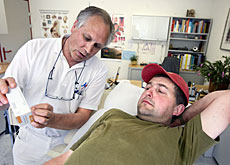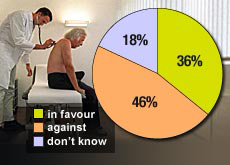Doctors prescribe single health insurance

Many doctors see a proposal to introduce a single insurance system as a cure for the costly Swiss health system, ahead of a nationwide vote on Sunday.
But otherwise support remains patchy, as the political left is divided over whether the new scheme will be any improvement. They are up against a united front presented by opponents in parliament and the industry.
Switzerland’s current health system is made up of obligatory basic health insurance as offered by 87 providers. Supporters of the reform want to replace the scheme with a single insurance, with premiums based on personal income and wealth.
A survey carried out by the Swiss Association of General Medicine, which represents general practitioners, found that 55 per cent of GPs were in favour of the change, with the percentage particularly high among French-speaking medics.
“This shows how there is dissatisfaction with the current situation, with the many insurance companies and the administrative burden,” said Hansueli Späth, the association’s president.
“We also feel there is a mistrust on the part of the health insurances about medical treatments.”
The doctors therefore hope the new system will lessen the administrative load and allow all those affected – patients, doctors and the country’s 26 cantonal authorities – to have more say in its management.
Späth does not, however, believe that the changes would affect medical tariffs which are worked out jointly by doctors and the health insurers.
Costs
But this is precisely the main concern of the umbrella organisation of Swiss health insurances, which believes costs could rise under the new system.
“In principle, those who are paid for their services could at the same time be deciding about higher medical fees under a single health insurance system,” said santésuisse spokesman Paul Rhyn.
Santésuisse says that what doctors see as mistrust is simply checks on whether they are working cost effectively at a time when health costs are spiralling. This is hard for many medics to accept, says Rhyn.
Although many smaller associations support the proposal, the main Swiss Medical Association, which represents the whole profession, has not advised its members on which way to vote.
Otherwise, apart from some doctors, support for the reform comes from the political left. The Social Democrats who helped to launch the initiative, are the only political party in government to support the move.
But divisions among the left over the costs of the plan may not help their case, says Zurich University political expert Marc Bühlmann.
“It is the only vote on March 11 and supporters are presenting themselves in a half-hearted way and not at all as one,” said Bühlmann.
He warns they face a united front presented by the opponents on the right and have history against them too. Most people’s initiatives failed to pass at the ballot box.

More
Health insurance
Splits
A look at the traditionally left-leaning organisations confirms the splits. Not all trade unions agree with the initiative because they are worried it will hit middle-income families hard.
Consumers’ organisations are divided along language lines, with the main French-speaking one coming out in favour but the German-speaking Consumer Protection Association refusing to take a stance.
There has been criticism that the initiative’s supporters did not initially advance any figures on how much premiums would be under the new plan, to back up their argument.
It allowed santésuisse to pre-empt matters and publish its own model on a comparison website showing that those with an income of more than SFr30,000 ($24,000) were set to lose out.
The supporters finally responded with their own figures on the same website, showing different results. Visitors can now compare the two.
The Social Democrats explained the delay by the fact that similar initiatives which had given figures had failed.
“We draw up the important fundamentals and the legislature then only has to work out the details for the change to the constitution,” party leader Hans-Jürg Fehr told Swiss television.
swissinfo

More
Santé Suisse
The people’s initiative is calling for a single health insurance company to replace the current 87 firms and premiums based on personal income and wealth.
It was launched in 2004 by a family association in western Switzerland and has been signed by 111,154 people.
The proposal is backed by the political left, trade unions and some doctors associations.
Those against are the government, a majority of parliament, the business community, health insurers and the parties on the centre-right and right.

In compliance with the JTI standards
More: SWI swissinfo.ch certified by the Journalism Trust Initiative


You can find an overview of ongoing debates with our journalists here. Please join us!
If you want to start a conversation about a topic raised in this article or want to report factual errors, email us at english@swissinfo.ch.